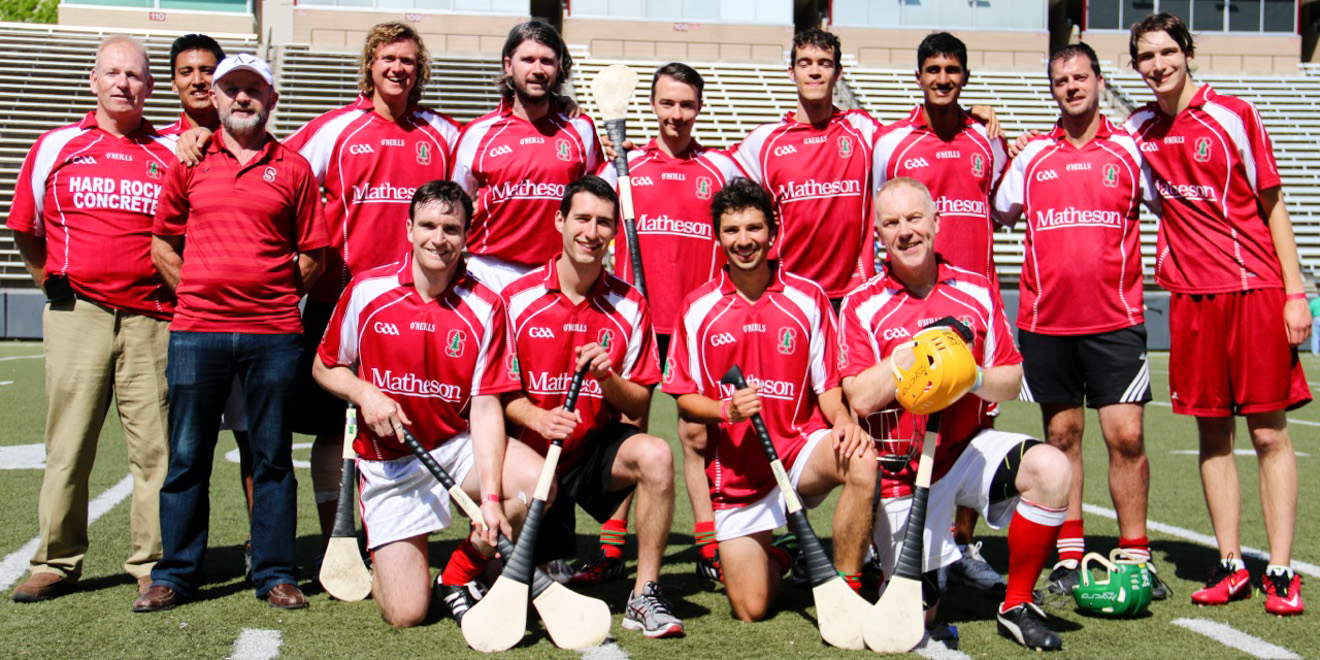Never heard of hurling? You’re not alone. But this ancient Irish game is on the rise at colleges across the U.S. — including right here at Stanford. And this past weekend, the Cardinal finished as runners-up in the National Collegiate Hurling Championship in Montana.
Hurling is a high-contact, fast-paced sport that dates back thousands of years. It’s integral to Irish culture and is fast gaining in popularity in the U.S. — even if many Americans still confuse it with curling, or, worse, with the unfortunate after-effect of too much drinking.
But don’t let that put you off. Hurling is riveting to watch and requires courage, speed and grace to play. Each player carries a hurley – similar to a hockey stick — on which they balance the ball as they run, scoring either by hitting the ball through the posts for a point or into the net for a goal.
The 12-man Stanford squad put in a heroic performance over a grueling weekend at the Washington-Grizzly stadium in Missoula, playing a total of five games. They beat the Universities of Pittsburgh and Connecticut to make it through to the semifinal against rival UC Berkeley.
[justified_image_grid preset=1 ids=1101501,1101502,1101503,1101504,1101505,1101506,1101507 row_height=325 height_deviation=50 disable_cropping=yes last_row=flexible_match lightbox=prettyphoto]
Stanford was down two points to Cal at halftime, but came back fighting, ultimately crushing the Bears in a nail-biting display of grit, determination and teamwork in the second half to cruise to a 20-6 victory. There were many great performances, notably from Stanford’s Matt Mistele, Kevin McCabe, Peter Salazar and James Merrick.
But it was always going to be a tough final on Sunday against the reigning champions, the Montana Grizzlies, who had impressed throughout the tournament and were playing on their home patch in front of a passionate crowd.
Stanford put in a strong and spirited performance, but it wasn’t enough to bring the trophy to the farm. Montana scored a couple of early goals and several points in the first half, leaving Stanford in an early hole.
The Cardinal came out strong after the break, with Colin Roach solid up front and two goals from Merrick. There were sterling performances across the board — many played through injuries — but the team wasn’t able to claw back, and Montana seized every opportunity to hammer home its advantage. The final score was 27-10 to the Grizzlies.
“It’s a little bittersweet to travel so far and come so close,” said Salazar, a Stanford captain from Colorado, who is graduating as a history major in a few weeks. “It was great to be able to play with these guys one last time and I’m proud to go out on this.”
Salazar, one of Stanford’s most productive players, has been hurling since he first arrived at the university in 2010.
“We really didn’t give up. We fought to the last second,” said Trevor Kalkus, a coterm in electrical engineering from Colorado.
Other players felt a similar mix of emotions as the final whistle blew.
“I’m very disappointed not to win the final,” said Merrick, a doctoral student in the department of management science and engineering, who actually hails from Ireland. “But I’m very proud of the team for reaching the final and for the strong performance on the field.”
The chair of the National Collegiate Gaelic Athletic Association, Cody Hedges, was also impressed.
“I was extremely excited to see Stanford in Missoula this year,” he said. “They came through in proving that they are a team to be reckoned with and will undoubtedly win their own championship title one of these days.”
The first National Collegiate Hurling Championship was in 2011, and since then, the sport has been growing in popularity. There are now 16 teams at colleges across the U.S., and a further dozen are thought to be in the process of forming.
Stanford’s hurling team came together in 2007, and in 2008, it was recognized as an official club sport by the university. The next year, Stanford played UC Berkeley in what was the first-ever collegiate hurling game in the country.
“Hurling is on the rise, although few people realize it,” Hedges said. He attributes its popularity to the “untainted, raw nature of the game” and the fact that it remains an amateur sport.
“This game has the potential to be the next great sport in America, especially in the colleges — there’s no stopping us now.”
Yes, hurling could be the greatest game you’ve never heard of. Just remember, it’s hurling, not curling!
If you’re interested in joining the Stanford hurling club, please contact Peter Salazar at [email protected]. Contact Cordelia Hebblethwaite at cordheb ‘at’ stanford.edu.
